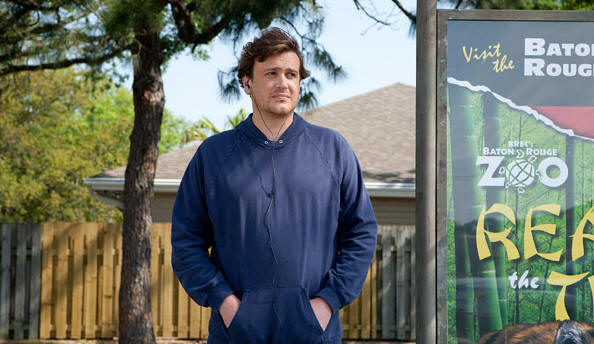MOVIE REVIEWS |
INTERVIEWS |
YOUTUBE |
NEWS
|
EDITORIALS | EVENTS |
AUDIO |
ESSAYS |
ARCHIVES |
CONTACT
|
PHOTOS |
COMING SOON|
EXAMINER.COM FILM ARTICLES
||HOME

Sunday, March 18, 2012
MOVIE REVIEW
Jeff, Who Lives At Home
Still At Home, But His Heart's Much Larger Than That

Jason Segel as the title character in Mark Duplass and Jay Duplass' comedy-drama
"Jeff, Who Lives At Home".
Paramount Vantage
by
Omar P.L. Moore/PopcornReel.com
 FOLLOW
FOLLOW
Sunday, March 18,
2012
Flavored with New Agey-ness, "Jeff, Who Lives At Home" represents a
decent but mostly lackluster effort from Mark Duplass and Jay Duplass, the
brothers who last directed the disappointing
"Cyrus"
(featuring a great Jonah Hill, released in 2010.) In "Jeff", Jason Segel
plays the title character, a lazy, unemployed, drug-toking "spiritualist" or
cosmologist whose life philosophy is framed by such pop culture sensations as
the film "Signs".
Jeff believes destiny awaits all and that at 30 he has a purpose beyond living
in his mother's basement. His snarky, smarmy older brother Pat (Ed Helms)
chastises him and suspects his own wife Linda (Judy Greer) is having an affair.
The brothers are without a father, who passed away, and their widowed mother
(Susan Sarandon) is having a mid-life crisis of sorts, augmented by a secret
admirer. All of these events conflate for an ending that is fairly
predictable, yet underline the points the lead character had been clumsily
trying to make throughout, only to be laughed at by Pat.
"Jeff, Who Lives At Home", which opened in the U.S. and Canada on a limited
basis on Friday, marks a departure from the sharper, quirkier fare of the
Duplass brothers but manages to be lighter and more comically gratifying in some
scenes than their previous efforts even as it journeys to its inevitable
conclusion. As Jeff, Mr. Segel hunkers down into a grimy, gentle giant of
compassion and goodwill, displaying the semi-serious attributes in an otherwise
comedic talisman. Jeff's self-awareness is both augmented and submerged to
a degree by a number of axioms, some of which have presumably kept him from
thinking too much about his underachieving life.
Even so, Jeff is a well-meaning soul, grateful for every useless and useful
event (the film cheekily shows some of them) in his life. Jeff is the
antithesis of Lester Burnham, whose mid-life crisis was a selfish romp in
rejuvenated teen misadventure as the lead character in "American Beauty".
By contrast, the more altruistic Jeff wants people around him, mainly those with
a better station in life than he, to dare to dream and elevate their lives.
Jeff himself is looking for the spark that will chart the course in what has
been a largely wasted existence thus far. He undertakes a somewhat
spiritual transformation, becoming the father that he lost, parenting everyone
around him with his insights and wisdom.
Episodically the film proceeds with the kind of happenstance often seen in
Alexander Payne's character-driven journey movies (most recently "The
Descendants", in which Ms. Greer appeared as the wife of a cheating husband.)
Yet is it really destined for these characters, who have been mired in mild
turmoil or mystery for more than an hour, to suddenly find all the loose ends
fitting together by movie's end? The film, whose title needed reworking,
lets them all off relatively easily at the expense of its message of unyielding
exploration to attain a joie de vivre. "Jeff" has occasionally touching
instances but these are ephemeral. Even when the film's loose ends are
tied they don't feel secure. Everything has been achieved and settled
almost too quickly in 83 minutes, even if there are scenes that vindicate Jeff's
raison d'etre.
Set in Louisiana, "Jeff, Who Lives At Home" punctuates its slender running time
with commentary about the purpose of life, chance and journey, and uses
large symbolic events to signal magical transitions in characters, but such
gambits fall short, seeming too big for what is a modest movie. The
characters the Duplass brothers have written are too quiet and mellow (with the
exception of Mr. Helms's obnoxious Pat) for such theatrics, and the abilities of
Ms. Sarandon, good but somewhat squandered here, don't need any grandiose
spectacle to resonate.
One of the things that makes Ms. Sarandon so penetrating are her eyes. She
uses them in an effective way in minimal though resolute fashion that to
accompany her careful gestures with artificial diversions or gimmicks almost
undercuts her and her character. Ms. Sarandon percolates here as Sharon,
doing well in the relatively short time she's given. Ms. Sarandon is
always a sensual, intelligent and attractively earthy presence, whatever her
role in a film. Rae Dawn Chong (who was in "Cyrus") makes a rare and
welcome big screen appearance, and is an attractive and convincing presence,
mixing comedy with an air of child-like excitement in Carol, a colleague of
Susan's.
Overall though, there's a distinct feeling I had that the Duplasses dropped the
ball at the ten-yard-line on the way in to the end zone. With their latest
tragicomedy they score a touchdown without the ball in their hands. They
endeavor to make "Jeff, Who Lives At Home" something fresh and dynamic, and
although the comedy occasionally succeeds, the net effect is a film that falls a
little short of the goal line.
With: Steve Zissis, Evan Ross, Matt Malloy.
"Jeff, Who Lives At Home" is rated R by the Motion Picture Association Of America
for language including sexual references and some drug use. The film's
running time is one hour and 23 minutes.
COPYRIGHT 2012. POPCORNREEL.COM. ALL RIGHTS RESERVED.  FOLLOW
FOLLOW
MOVIE REVIEWS |
INTERVIEWS |
YOUTUBE |
NEWS
|
EDITORIALS | EVENTS |
AUDIO |
ESSAYS |
ARCHIVES |
CONTACT
| PHOTOS |
COMING SOON|
EXAMINER.COM FILM ARTICLES
||HOME

 FOLLOW
TWEET
FOLLOW
TWEET FOLLOW
FOLLOW